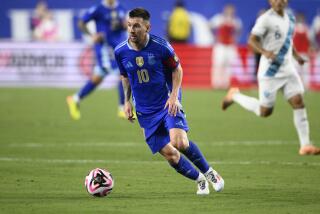All of Italy Cries Because of Argentina
- Share via
ROME — From the premier of the country to the humblest young pizza maker with his mother’s arm on his shoulder, from the fashion salons of Milan to the seamy side of Naples that Oscar Wilde must have overlooked, Italy has slid into a state of despair. The Azzurri, the home-standing Blues, have blown their chance for the World Cup.
“I am sad,” said Antonio Puoti, a Roman. “But I am not alone. There are 59 million other Italians -- maybe more -- who feel the same way. What are we to do?”
It’s something like Edmonton when it lost Gretzky, or Washington after a last-minute Redskins’ setback, but with the feeling extended across a whole country. It is the opposite the euphoria the United States experienced when its 1980 Olympic hockey team pulled the “Miracle on Ice.” Here, a nation fell madly in love and got jilted. It mourns.
“Baggio, I love you.”
“Schillaci, you’re the best.”
“Giannini, marry me.”
Italians by the thousands flocked daily to the hills south of Rome to watch their team practice. They read the countless newspaper stories and watched the nightly soccer specials on television that always highlighted the Blues.
The Blues had brought the country together in a way nothing else could. It was as though the people of Italy had realized that if this array of individuals could find harmony on a soccer field, rival regions could call a truce, prejudices could be set aside, the sameness of life could be forgotten in a month-long holiday. The players were truly a national team.
The baggy-pants Salvatore Schillaci came from Sicily, which has produced few heroes. There were other assorted demi-gods: the curly-haired rich boy, Roberto Baggio, bought by Juventus for a record transfer fee that reports have pegged at anywhere from $13 million to $20 million; the stately prince, Giuseppe Giannini; the boy next door, Gianluca Vialli; the wise man of the plains, Franco Baresi; the cover boy, Paolo Maldini; “Rambo,” Fernando De Napoli. They were Italy’s “Boys of Summer.”
And this was Brooklyn. All the songs turned sad. No one danced anymore. Flags were pulled in from balconies. Homes were shuttered. Trains ran late. Restaurants that closed for the fatal game against Argentina never reopened that night. It was as if someone at Pepco hit the wrong switch; there was silence and darkness. A “depressione,” la Repubblica observed, had hit “il Bel Paese,” “the beautiful country.”
For such a short man, Diego Maradona casts a long shadow over the 1990 World Cup.
At first considered a shadow of his former self, when the 1986 Cup belonged to him, he has come sharply into focus during the big games. He personally attended to the ruination of Brazil and Italy.
Nobody much likes to admit this, because Maradona is not very popular outside of Argentina and Naples, where he plays in the Italian League. A headline in the Turin sports daily Tuttosport screamed: “Maradona Is The Devil.”
“We all hate Maradona today,” said Rocco Montagnese, an Italian engineer. “Tomorrow, I don’t know.”
Maradona held up his hands and pleaded, “I celebrated our victory on the field. But then I calmed down, because I saw some of my (Naples) teammates were very sad. How can I be celebrating when my friends are sad?”
“Fat little hypocrite,” an English writer said.
“For Italy, football is cocaine,” Montagnese said. “It’s our drug. There are a lot of problems in Italy. A very bad labor problem. We forgot about everything during Mondiale (the World Cup). But now that the team is out, we have to think about things again.”
Maradona did it. Claudio Caniggia may have scored the goals against Brazil and Italy. But “the devil” let him do it.
At 29, Maradona is slowed from years of jarring takedowns. He plays only in brilliant spurts. But he has yet to relinquish the spotlight that was his in the 1986 World Cup-not to Brazil’s Careca (Maradona’s friend and Napoli teammate), not to Schillaci, who might have been the Maradona of 1990 had Italy won the Cup.
Sunday, Lothar Matthaeus of West Germany steps up. In the 1986 final, Matthaeus failed to prevent Maradona from playing a role in Argentina’s three goals. Sunday, Maradona must work without Argentina’s key scorer, Caniggia, ineligible because of accumulated fouls. Sunday stands to be Matthaeus’s day.
But Maradona will do almost anything to win. During a 2-0 victory over the Soviet Union, he stopped a shot that was a certain goal with his hand-and got away with it. It was reminiscent of the goal he scored in Mexico City with his fist, which he not-so-humbly called “the hand of God.”
“It was an instinctive reaction,” Maradona said. “I don’t feel guilty. The referee was standing only three yards away from me. Ask him why he didn’t call a penalty on me.”
After Italy fell, with Maradona getting the winning penalty kick, some people threw rocks at Maradona’s home outside Naples. All in all, he was forced to conclude: “You have to find inner strength to fight a hostile world.”
So what if the U.S.S.R. team had to sneak home, that Marco Van Basten and the Dutch looked to be in disarray, that English hooligans outlasted teams that were supposed to make the title game or close to it, that Italy had a train strike hardly anyone noticed given the uneven service, that press centers were spectacular in decor but had phones that often blocked the passage of information in or out, or that Naples’ pickpockets want every World Cup to be played in Italy? Cameroon made everything worthwhile.
It has been a World Cup of comebacks and unlikely heroes: 40-year-old English goalkeeper Peter Shilton, Belgium’s unretired Enzo Scifo who lacked the supporting cast, Roger Milla, at 38 the oldest Cameroon Lion. Distinctively, Milla came on in relief roles, his green jersey flapping outside his shorts.
An Italian poet named Enzo Spadoni was moved to hail Cameroon in advance of the tournament. In part he wrote: “Your colors have always shone in bristling challenges where titled nations will become careful in direct disputes.”
He seemed to be warning Argentina.
By the time the Indomitable Lions were finished, soccer’s international governing body, FIFA, declared that Africa had earned a third spot in the 1994 World Cup finals, at the expense of Europe.
African countries have one man to thank -- Milla. Brought back by popular demand from a dot on the Indian Ocean where he was playing for a small soccer club, Milla said, “I felt like a reserve soldier at the time of war. My duty called me.”






